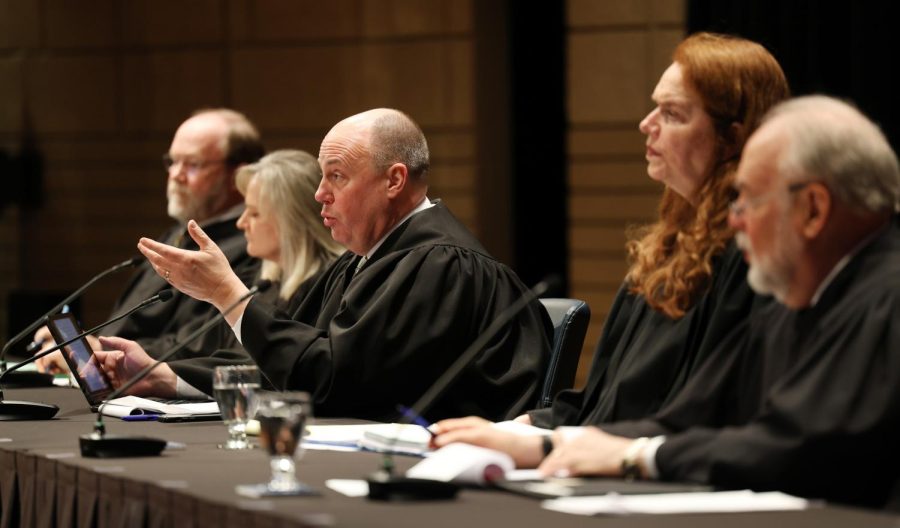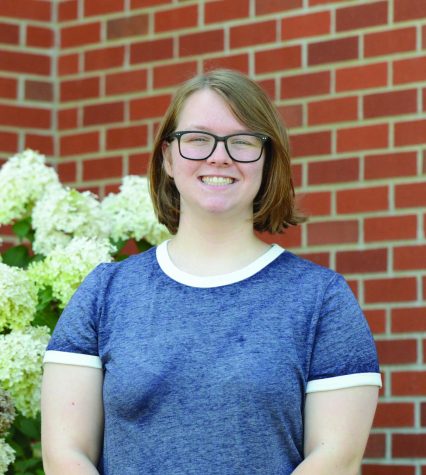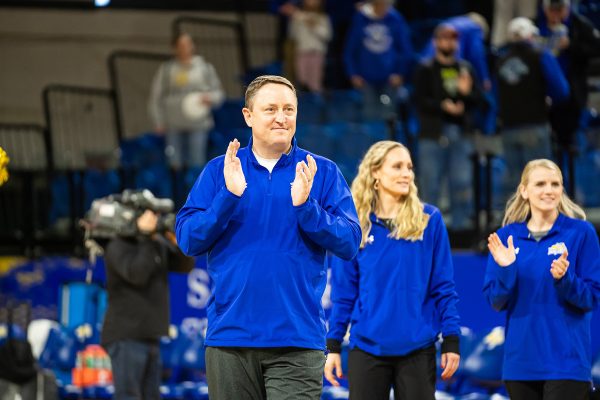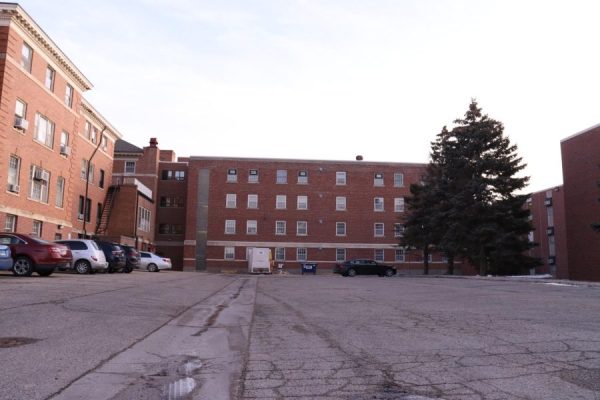SD Supreme Court visits campus, hosts public arguments
(From left to right) Attorneys Paul Swedlund, Jon Arneson and Jeff Beck representing different media outlets during the T. Denny Sanford case on the SDSU campus.
March 28, 2023
The School of American and Global Studies hosted the South Dakota Supreme Court March 21-23 during their spring traveling session.
Throughout the visit, the public had a chance to hear oral arguments of appellate cases and listen to the judges, local attorneys and law clerks answer questions about their jobs, experience and advice for students interested in law and legal studies in a series of panel discussions.
Lisa Hager, an associate professor of political science at SDSU, said the supreme court has visited campus before, though their last visit was over 10 years ago in 2012.
“They have been doing some traveling terms, and they are trying to go to different regional institutions, but the pandemic had kind of thrown things out of whack, and so they’re just now kind of getting back into it,” she said.
The judges arrived Tuesday to hold closed-door sessions, followed by a welcome reception.
Then the court heard oral arguments on four cases Wednesday and Thursday morning, all held in the Larson Memorial Concert Hall at the Performing Arts Center.
One notable case from the event was between actor Kevin Costner and Black Hills artist Peggy Detmers about a contract regarding her statues at his tourist attraction Tatanka near Deadwood. Another involved whether media outlets can request to unseal files related to child pornography investigation of T. Denny Sanford.
During the first panel discussion Wednesday afternoon, attorneys from around the state talked about how they prepare for trials, why they decided to go to law school and more. One question brought up was how the attorneys still stay friendly with each other in their line of work, considering many on the panel had argued against each other before.
“I think people generally misunderstand how relationships between attorneys work,” said Chris Nipe, an attorney from Mitchell. “I think if you want to do a good job of representing somebody, you still have to place some trust in attorneys you’re in opposition to, and I think that there is a lot of camaraderie.”
The panel also gave advice to students thinking about going to law school in the future.
“Once you get there, law school can humble you really fast,” Courtney Chapman, a litigation attorney, said. “Don’t be discouraged if you don’t get the results you want on that first final or that first test, because it happens to so many of us.”
Supreme court judges also held a panel that day, discussing what their daily work looks like, how they ended up on the supreme court and what they enjoyed most about their jobs.
“One thing I mentioned is just the notion of working on a system that I really believe in and I believe delivers justice every day to people throughout the state of South Dakota,” Chief Justice Steve Jensen said.
Aftyn Heitkamp, a third-year criminology and sociology major, attended the visit and said getting to see cases being presented in person was very educational for her.
“I have a class that we are doing oral argument simulations, just like the supreme court listened to,” she said. “Being able to (listen to) an actual case be presented in front of me gave me such great insight into our justice system.”
Hager said hosting events like these make it easier for the public to see the legal process in their state.
“The big thing is transparency in government, so that there’s actually this opportunity to see what’s going on with the state supreme court rather than just hearing about it or maybe having to seek out more information about the cases that they’re hearing,” Hager said.
It also benefits students interested in political science and law to get to see what a possible career in the justice system might lead to.
“Having the opportunity for students to go and watch what a court is really like can help them decide if law is the field they want to go into,” Heitkamp said. “It is also a great recruiting topic for new students. Most people believe that the school down south is the only place to go when considering law as a career, and that is simply not true.”
SDSU’s political science and legal studies courses occasionally partner with the University of South Dakota’s Knudson School of Law to organize visits for students.
“There’s definitely a partnership with the University of South Dakota, in terms of just using them as a resource when it comes to going down there for a day and seeing what law school is like,” Hager said. “Even if you’re not interested in going to USD, it is the closest law school for us to travel to and kind of get some of that experience.”
SDSU also has the Pre-Law Society, where students can listen to workshops, prepare for the LSAT test to get into law school and host speaker events. Hager said one of their upcoming events is partnering with the Twitter Politics Honors Colloquium to host a guest speaker lecturing on freedom of speech.
Hager also mentioned that Pre-Law Society is not just for those enrolled in legal studies.
“Sometimes pre-law is something that you kind of think about after you’ve been here for a little bit, so it’s definitely something open to anybody with an interest there,” she said.


























